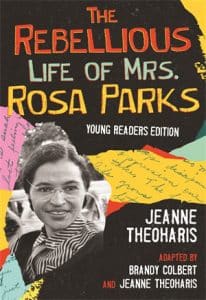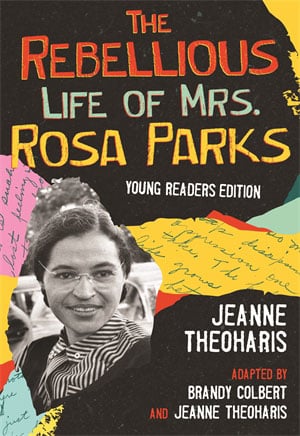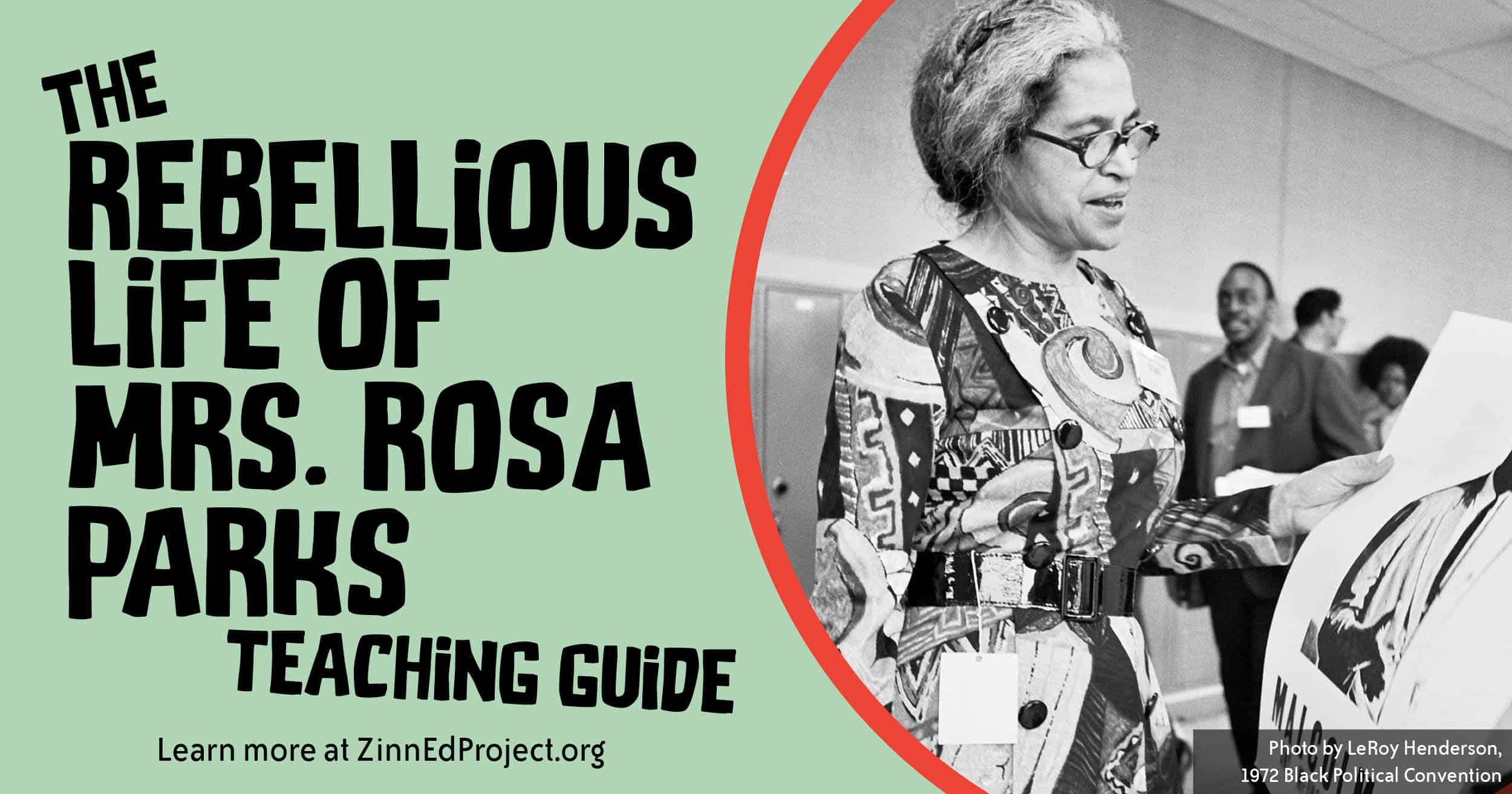 These terms were identified by the teaching guide writers for The Rebellious Life of Mrs. Rosa Parks as ones that students might have questions about. Let us know if there are more that you recommend we add.
These terms were identified by the teaching guide writers for The Rebellious Life of Mrs. Rosa Parks as ones that students might have questions about. Let us know if there are more that you recommend we add.
TERMS
Black Freedom Struggle
The long struggle that has taken place throughout modern U.S. history for African Americans to gain civil, economic, and political rights. The Black Freedom Struggle is a term that can capture Black organizing in support of the Scottsboro Boys in the 1930s, direct action events like the Montgomery Bus Boycott in the 1950s, and the defense of Black political prisoners like Angela Davis in the 1970s.
Black Power
As a particular era in the longer Black Freedom Struggle, Black Power reached its heyday between the mid-1960s and the mid-1970s. Rather than stressing principles of non-violence or integration, Black Power stressed racial pride, self-determination, economic justice and independent political power. Black Power and civil rights activists were not at odds with each other, even though commentators often liked to pit them against each other.
Civil Rights Movement
Usually refers to an era of the Black Freedom Struggle that occurred between the 1930s and the Black Power movement of the 1960s. It stressed legal rights and achieving political wins, such as significant legislation like the 1964 Civil Rights Act which, among other things, outlawed de jure segregation.
Freedom
The most frequent battle-cry of the Civil Rights Movement. Stressing that they sought freedom, civil rights activists understood it as the ability to come into full political rights and personhood. Calls for freedom showed that many African Americans saw a continuation between enslavement and the present because of the degree of white control over their lives.
Gradualism
An approach to gaining civil rights that stressed a patient or “gradual” process, often in contrast to more militant or demanding approaches that tended to stress that Black people had waited long enough for their rights. This approach tended to stress the (false) idea that racial progress was inevitable.
Integrationist
A person or group who promoted the integration of schools, public transportation, or other facilities — usually in a way that sought integration as an end in itself rather than as a means to redistribute power or resources more equitably. It may be helpful to think about integration as different from desegregation. Whereas people might promote desegregation in order to ensure, for instance, that Black students were not assigned to under-resourced schools, someone promoting integration of schools may believe that multiracial schools are, in and of themselves, inherently important and good.
Internationalism
An outlook or approach to gaining Black freedom by stressing the connectedness between Black people in the U.S. and around the globe. This connectedness has often been highlighted through a sense of shared history or shared destiny of Black people.
Pan Africanism
A form of Black Internationalism that stresses the commonalities of, and urges the unity of, people on the African continent and people of African descent across the diaspora.
Self-defense
Not to be understood as the opposite of non-violent protest, self-defense was often promoted and practiced during the Civil Rights Movement by the same people or groups who also practiced non-violent methods. In the U.S. South in particular, a long and rich tradition of armed self-defense characterized African Americans’ abilities to survive and protect themselves, their family, and their property.
ORGANIZATIONS
Communist Party
The Communist Party USA was founded in 1919 as a Communist political party and organization. During the 1920s, following the direction of international Communists, it promoted Black self-determination and statehood in the South. In the 1930s, the Party aggressively recruited amongst African Americans and supported numerous Black freedom causes, including defense efforts for the so-called Scottsboro Boys.
Montgomery Improvement Association (MIA)
The Montgomery Improvement Association was formed in December 1955 to coordinate the bus boycott. Reverend Martin Luther King Jr. headed the organization.
National Association for the Advancement of Colored People (NAACP)
Founded in 1909, the National Association for the Advancement of Colored People is one of the oldest civil rights groups in the U.S. During World War II, when Rosa Parks first joined the Montgomery chapter, the NAACP experienced a surge in membership, but during the Cold War, segregationists targeted and redbaited the group and its members.
The Republic of New Afrika (RNA)
The Republic of New Africa (later Afrika) has been in existence since March 1968, when it was created by Detroit-based brothers Milton and Richard Henry (later Gaidi and Imari Obadele). The RNA advocated the creation of a new Black nation to be formed in the Southern Black Belt (South Carolina, Georgia, Alabama, Mississippi, and Louisiana). In 1970, several members moved to Mississippi to start making the Black nation a reality, but they were heavily targeted by the state.
The Southern Christian Leadership Conference (SCLC)
The Southern Christian Leadership Conference got its start in 1957, roughly six months after the Montgomery Bus Boycott’s successful finish. Led primarily by Black male ministers in the South, the Reverend Dr. Martin Luther King Jr. was at its helm until his assassination in 1968. The SCLC helped to mobilize people in several major Southern civil rights campaigns of the 1960s, including the 1963 Birmingham and 1964–1965 Selma campaigns.









Twitter
Google plus
LinkedIn